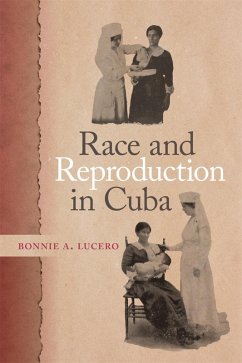Women's reproduction, including conception, pregnancy, childbirth, breastfeeding, and other physical acts of motherhood (as well as the rejection of those roles), played a critical role in the evolution and management of Cuba's population. While existing scholarship has approached Cuba's demographic history through the lens of migration, both forced and voluntary, Race and Reproduction in Cuba challenges this male-normative perspective by centering women in the first book-length history of reproduction in Cuba.
Bonnie A. Lucero traces women's reproductive lives, as well as key medical, legal, and institutional interventions influencing them, over four centuries. Her study begins in the early colonial period with the emergence of the island's first charitable institutions dedicated to relieving poor women and abandoned white infants. The book's centerpiece is the long nineteenth century, when elite interventions in women's reproduction hinged not only on race but also legal status. It ends in 1965 when Cuba's nascent revolutionary government shifted away from enforcing antiabortion laws that had historically targeted impoverished women of color.
Questioning how elite demographic desires-specifically white population growth and nonwhite population management-shaped women's reproduction, Lucero argues that elite men, including judges, physicians, philanthropists, and public officials, intervened in women's reproductive lives in racially specific ways. Lucero examines how white supremacy shaped tangible differences in the treatment of women and their infants across racial lines and outlines how those reproductive outcomes were crucial in sustaining racial hierarchies through moments of tremendous political, economic, and social change.
Bonnie A. Lucero traces women's reproductive lives, as well as key medical, legal, and institutional interventions influencing them, over four centuries. Her study begins in the early colonial period with the emergence of the island's first charitable institutions dedicated to relieving poor women and abandoned white infants. The book's centerpiece is the long nineteenth century, when elite interventions in women's reproduction hinged not only on race but also legal status. It ends in 1965 when Cuba's nascent revolutionary government shifted away from enforcing antiabortion laws that had historically targeted impoverished women of color.
Questioning how elite demographic desires-specifically white population growth and nonwhite population management-shaped women's reproduction, Lucero argues that elite men, including judges, physicians, philanthropists, and public officials, intervened in women's reproductive lives in racially specific ways. Lucero examines how white supremacy shaped tangible differences in the treatment of women and their infants across racial lines and outlines how those reproductive outcomes were crucial in sustaining racial hierarchies through moments of tremendous political, economic, and social change.
Dieser Download kann aus rechtlichen Gründen nur mit Rechnungsadresse in A, D ausgeliefert werden.









